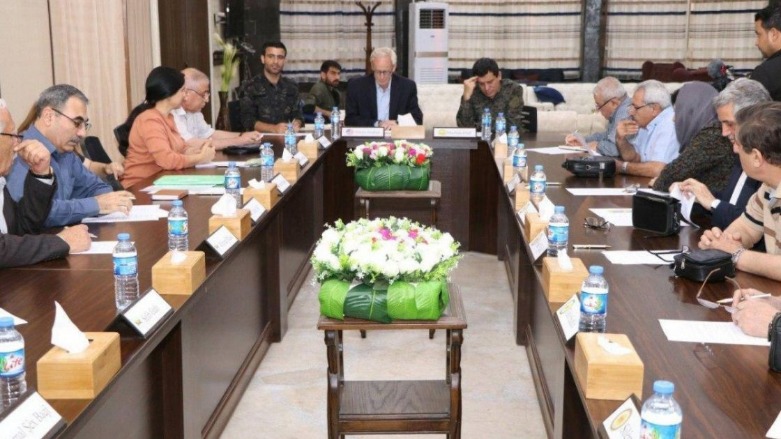Despite obstacles, Syrian Kurds continue unity talks
The two leading Kurdish political forces in Syria, the Kurdish National Unity Parties (PYNK) and the Kurdish National Council (KNC), have said that they will soon continue intra-Kurdish dialogue, denying rumors that the talks have failed.

ERBIL (Kurdistan 24) – The two leading Kurdish political forces in Syria, the Kurdish National Unity Parties (PYNK) and the Kurdish National Council (KNC), have said that they will soon continue intra-Kurdish dialogue, denying rumors that the talks have failed.
The PYNK is an umbrella entity composed of groups allied to the Democratic Union Party (PYD) that serves as the political wing of the People’s Protection Units (YPG), which spearheads the US-allied Syrian Democratic Forces (SDF).
Informed sources told Kurdistan 24 that the talks were temporarily paused, but were never officially suspended despite such claims in local media.
Democratic Left Party Secretary General and a senior leader in the Kurdish National Unity Parties (PYNK) alliance, Salih Gheddo, told Kurdistan 24 on Saturday that progress in Kurdish unity talks is still being actively pursued by the political parties involved.
“The [intra-Kurdish] dialogue has not stopped; it continues,” Gheddo told Kurdistan 24.
“The propaganda reports which say ‘the talks are suspended and there are disputes [between the parties]’, are not correct,” he added.
SDF Commander-in-Chief Mazloum Abdi also recently told Al Monitor that he had a recent meeting with a KNC delegation that came from Erbil.
“Our talks are continuing. If we persevere, we will succeed. If good things are desired for Rojava by all sides, then the problem will be solved,” he said.
The PYD and the KNC have continued negotiations that began in early November to discuss the need for unity after Turkey’s cross-border offensive in northern Syria in October 2019. The resumption of Kurdish unity talks was an initiative Abdi to overcome Kurdish political differences in Syria
Tensions between the KNC and PYD increased following the outbreak of the Syrian civil war in 2011, with the latter playing a significant role in the establishment of the self-administration that has ruled northeastern Syria.
The two sides have not successfully cooperated as had been hoped, in part because agreements they reached in Duhok and Erbil between 2012 and 2014 were never effectively implemented.
The United States has publicly supported the SDF’s initiative to bring the Kurdish parties together. The Kurdistan Region has similarly expressed its backing of the efforts.
Although the talks continue, the Kurdish parties still have fundamental disagreements on the criteria for the sharing of positions within the local administration in Syria. Nevertheless, with the US being a serious mediator, the parties continue to participate in the dialogues now focused on power-sharing.
Sinam Mohamed, the representative of the Syrian Democratic Council (SDC) in Washington, said during an event on Tuesday organized by the International Center for the Study of Violent Extremism that the focus of the talks is now on how the “KNC can participate” in a local administration.
However, she added that the participation of the Rojava Peshmerga and the military file has not been discussed yet.
“They can discuss this together, but it is still going on and we going to continue this dialogue together and be successful.”
Moreover, the Syrian opposition group known as the Peace and Freedom Front, which was established last summer by Assyrian and Syrian Arab opposition parties and the KNC, supports the intra-Kurdish dialogue.
Gabriel Moushe, the spokesperson for the group, and a member of Assyrian Democratic Organization (ADO) told Kurdistan 24 during a visit to Erbil on Monday that, “in the future, we want all the (ethnic) components and nations of the region, including the Assyrians, Syriacs, Chaldeans, Arabs and Kurds, to take part in these negotiations, so that the current administration can be re-established in a just manner.”
He added that ADO discussed joining the local Kurdish-led administration in 2014, but that these talks ultimately failed. Moushe expressed hope that other ethnic communities will hopefully join a new more inclusive and democratic administration.
Editing by John J. Catherine